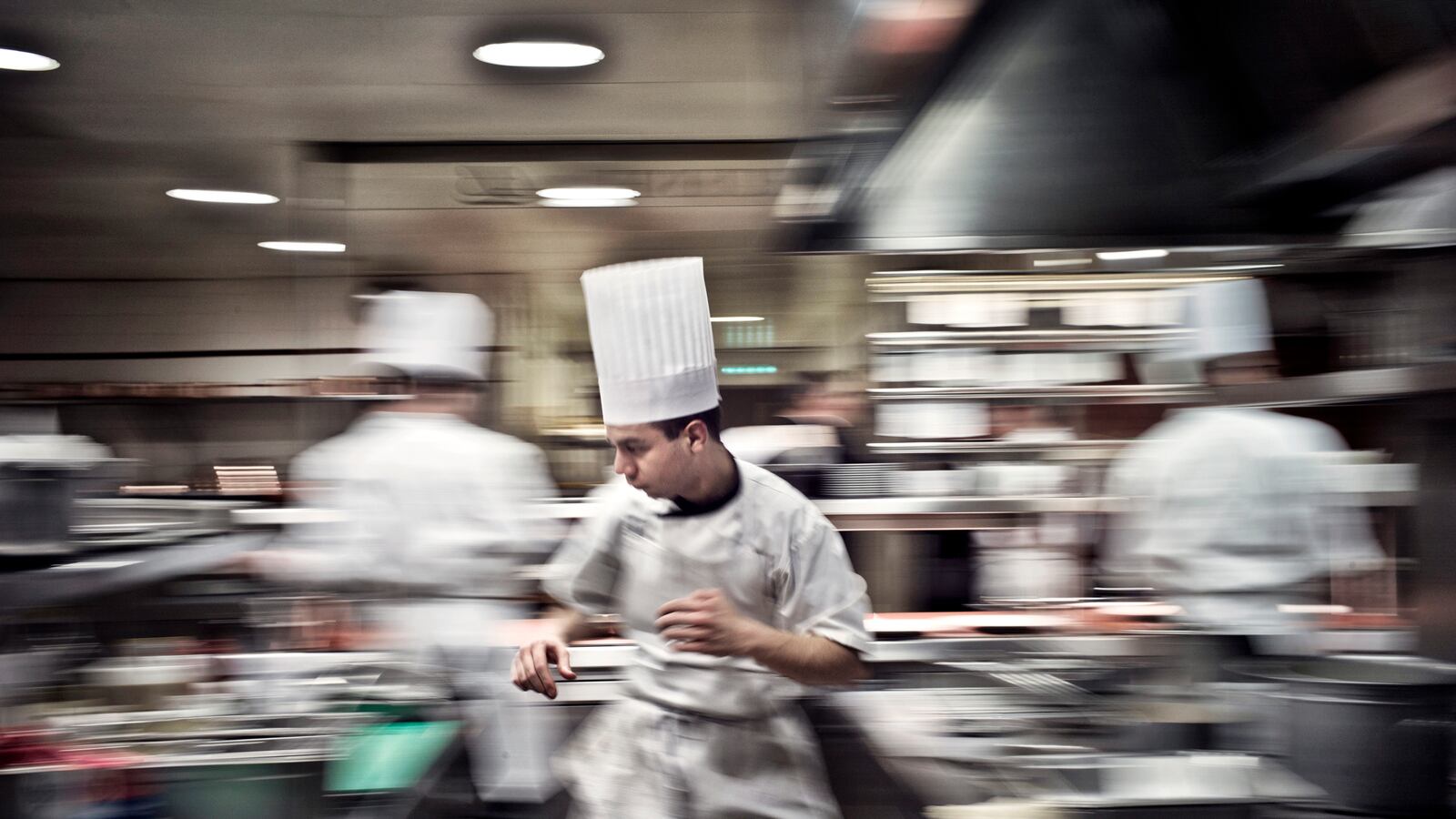On the drive from Paris to the south of France before the advent of high-speed trains, holiday-goers would often pause in the small town of Saulieu for a meal. The hamlet had long maintained a reputation for hospitality—even Madame de Pompadour, King Louis XV’s mistress, was known to have spent the night there. When Michelin, the legendary tire manufacturer, published its first guidebook for French motorists in 1900, its original raison d’etre was to direct travelers to towns like Saulieu where they could find a good meal, a comfortable place to stay…and trusty auto repair shops.

Today, Saulieu is most famous as the home to Relais Bernard Loiseau, a luxury Relais & Châteaux property with a legendary three-star Michelin restaurant. The eponymous chef, Bernard Loiseau, was one of France’s first modern interpretations of the celebrity cook, with branded kitchenware, frozen goods, and an unmistakable radio and television presence.
But behind the manic Emeril-esque enthusiasm was the shadow of a man obsessed; he was “an exalted personality whose megalomania was in pursuit of an unattainable ideal,” according to Rudolph Chelminski’s aptly named biography of Loiseau, The Perfectionist. He was indeed “caught in the trap of his own perfectionism.”
He clung to tangible markers of success like Michelin’s highest honor, a three-star rating, but was forever “haunted by the idea of losing his [third star].” Rumors gently circulated that restaurant reviewers for Michelin and competing guidebooks weren’t as impressed with his restaurant as they had been in the past. And although Loiseau didn’t lose his top-tier rating, the fear of a future demotion was palpable. When the high season waned during a particularly gloomy February in 2003, Loiseau took his own life with a firearm—a gift from his wife two years prior.
When Loiseau’s right-hand man, Patrick Bertron, assumed control of the kitchen after his death, it seemed that a new era was dawning. The late naughts marked the beginning of an entirely new form of restaurant appraisal: the mass critique. The influx of websites and social media platforms, like TripAdvisor and Yelp, allowed users to share their own reviews, and suddenly it seemed the voices of many could eclipse the esteem of the expert few.
“I find that people take themselves more seriously these days,” says Bertron, citing the growing popularity of opinion websites in the last few years. “They take on a role. Some are blasé and never satisfied.” He insists that patrons have long offered their opinions to the staff while visiting, but grapples with the new way they define their experience through images and the written word.
Wandering through the stainless steel arena of his kitchen, Bertron meditates upon the weight of the gradual spike in crowd reviews. Although undisturbed by the notion that every single diner could post their opinions in a very public place, he acknowledges that our penchant for oversharing has evolved (or perhaps devolved) in such a way that chefs must take into account the expectation that diners will fastidiously record the contents of their plates with a snap of their iPhone. “What’s next? Video cameras at the table?”
Regardless of the ever-growing nature of our everyone-is-an-expert culture, Bertron remains certain about the importance of the Michelin review. “We are all victims of our preferences, but the Michelin experts are trained to look at a meal in a more objective manner. They can distinguish beyond their personal preferences. You can be a movie critic who likes comedies, but still critique a horror movie favorably. You just don’t find a lot of impartiality with mass reviews.”
What troubles Bertron isn’t the onslaught of customer opinion; it’s the way in which we go about recounting our experiences and consuming other people’s reviews. In the world of online criticism he believes that we seem to have lost our way. “When you test-drive a Ferrari you shouldn’t care about the size of the glove compartment,” Bertron’s says, believing that meals should be evaluated holistically.
“There’s also a disconnect between what you read and how you interpret it,” he continues, concerned by those who peruse a glut of reviews before their vacation. Travelers are in danger of losing the “sparkle in their eyes” if they know too much in advance. “We idealize things we’ve heard of—teasers for a movie make the film implicitly bad because we’ve seen it all already. It breaks the magic.”
Bertron believes that criticism doesn’t necessitate a critical opinion. In the new world order where every diner is a critic, there is a lot of feigned expertise. He believes that when people don’t have an informed opinion, they often search until they find a fault in the food, equating their discovery of a negative element with a professional critique—“it’s only human,” he notes.
Arnaud Faye, who spent four years under the tutelage of Bertron at Relais Bernard Loiseau, has a similar outlook. “I see no links between the TripAdvisor trend and changes in the kitchen,” Faye says. Faye, 35, is the executive chef at the Auberge du Jeu de Paume in Chantilly and has already accrued two Michelin Stars at a restaurant concept that is merely 2 years old, a seemingly impossible feat when one examines the annals of Michelin.
“I always use TripAdvisor to search for hotels, but I would never use it as a resource for restaurants. And I think this notion is pretty global” he says. Despite being younger than Bertron and thus growing up with a more inextricable relationship to the web, Faye’s perusal of user-generated data remains divorced from his dining experience. “What is interesting however—and I must say quite clever—is that Michelin lets you leave comments online now too. So, presumably, if they’re getting a lot of bad comments for one particular restaurant, they can check to see if they need to remove the star,” Faye says. Adding an online forum is a clear acknowledgment on Michelin’s part of the prominence—and perhaps importance—of the collective voice.
“Michelin will stay until Michelin decides to stop,” states Bertron. “They sell happiness with their guide. Yes, they are evolving with their website and a reservations module, but it’s not power that they have—it’s communication. It fills tables because it’s the reference. Michelin isn’t about discovering talent, it’s for people who have arrived and offer a certain level of service every day. There is a certainty with Michelin.”
It would seem then that perhaps Michelin has stumbled upon the secret sauce that other reputed travel-related brands have failed to create—a system that gives the public their voice while still successfully issuing its yearly expert ruling.
We can’t, however, discredit opinion sites or food blogs that lack the umbrella of expertise, even though the chefs themselves don’t lend them much credence. While triangulating massive swaths of TripAdvisor data ultimately reflects the fact that the cream does indeed rise, it’s the foraging element that has the most credence when held against the guidebook name brand. Travelers and diners are the ones with their ear to the ground, always uncovering new things and testing out the old in a self-perpetuating system of checks and balances. Michelin, according to Bertron and his peers, sends clandestine reviewers roughly twice a year.
Bertron speaks about Michelin with a casual reverence and insists that—at least in France—there’s a marked shift in press and patronage when your establishment receives its second star, which means that diners still pay quite a lot of attention to the guidebook’s preferences.
Faye has no answer when asked how he plans to achieve his third Michelin star, “but the most important key is that the customer walks away feeling like they lived an experience.”
“When there’s a guy who eats alone he eats extremely well at our restaurant because he might be a reviewer for a guide,” Bertron jokes, but after much prodding he’s genuinely unflustered by the notion that anyone who sits at one of his tables potentially has the power to communicate their opinion to the masses. The ethos appears to remain unchanged at Loiseau’s establishment regardless of the prominence of the layman’s voice. “I just care about the client. It’s what motivates me in the morning. I express this in the service and what’s on the plate. I also want to make sure the client’s time is perfect.”
“You have to stay Zen,” Bertron adds. “Although I am an artisan and not an artist, it’s a lot like performing in the theater. You’re either thrown roses or tomatoes.”





